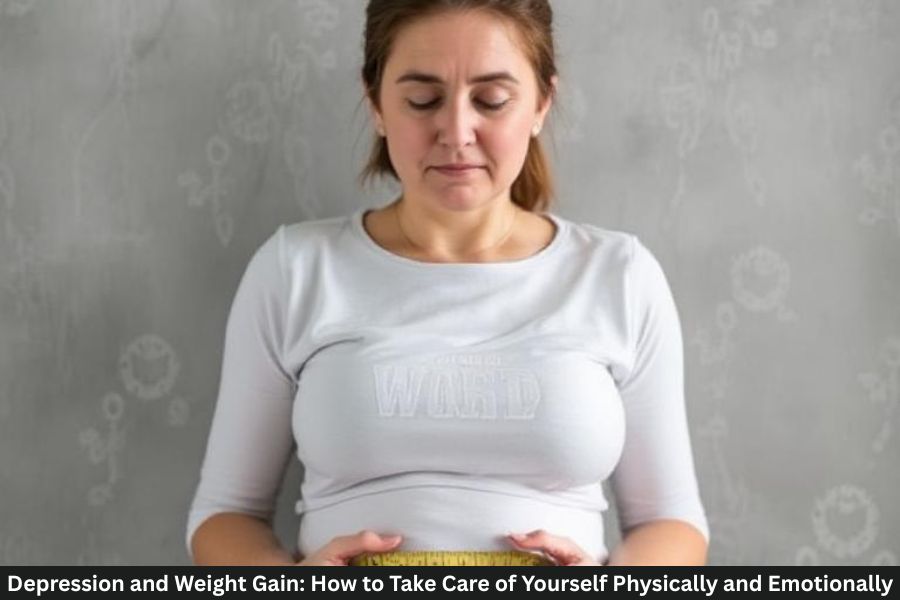Depression doesn’t just affect your mind—it influences your entire body. When you feel low, your brain chemistry changes, especially involving serotonin and cortisol. These fluctuations can slow your metabolism, alter your appetite, and make you crave comfort foods that temporarily boost mood but contribute to weight gain.
How Depression Impacts Appetite and Metabolism
Some people with depression lose their appetite, while others turn to food for emotional comfort. High-calorie, sugary, or fatty foods trigger dopamine—the “feel-good” neurotransmitter—creating a short-lived sense of relief. Unfortunately, this pattern can lead to unintentional weight gain, sluggishness, and guilt, which further deepen depression.
Hormonal Imbalance and Weight Changes
Depression affects the endocrine system, which regulates hormones like cortisol. When cortisol levels remain high due to chronic stress or sadness, your body holds on to fat, especially around the abdomen. Meanwhile, low serotonin levels increase cravings for carbs and sweets—creating a biological tug-of-war between comfort and control.
The Emotional Cycle of Weight Gain and Low Self-Esteem
Weight gain can lead to shame and lower self-confidence, which can intensify depressive feelings. This cycle—feeling depressed, overeating, feeling guilty, and repeating—can feel endless. Recognizing this emotional feedback loop is the first step to breaking free from it.
Recognizing Triggers for Emotional Eating
Emotional eating is not about hunger—it’s about distraction and comfort.
Ask yourself:
- Am I truly hungry or just bored, stressed, or sad?
- What emotion am I trying to soothe with food?
Once you identify your triggers, you can replace the habit with healthier coping mechanisms like journaling, walking, or calling a friend.
Physical Self-Care for Managing Weight During Depression
Physical activity is one of the best natural antidepressants. It boosts endorphins, improves sleep, and increases energy. Start small:
- Take a 10-minute walk
- Do light yoga or stretching
- Dance to your favorite song
Movement, no matter how simple, reconnects your mind and body—and helps you feel more in control.
Nourishing Your Body with Mindful Nutrition
Food is fuel, not punishment. Focus on nutrient-rich meals that balance your mood and hormones:
- Omega-3 fats (found in salmon, walnuts, flaxseeds)
- Leafy greens and berries (antioxidant powerhouses)
- Whole grains (for steady energy and serotonin support)
Avoid crash diets—they increase stress and slow metabolism. Instead, practice mindful eating: savor flavors, eat slowly, and listen to your body’s cues.
The Role of Sleep in Mental Health and Weight Control
Depression often disrupts sleep patterns. Poor sleep increases cravings, especially for high-carb foods, while reducing energy for physical activity.
Try:
- Maintaining a regular bedtime
- Limiting caffeine and screen time
- Creating a calming bedtime ritual
A well-rested brain makes better decisions for your health and emotions.
Stress Management Techniques for Emotional Balance
Managing stress can reduce both depression and weight gain. Consider:
- Meditation or deep breathing to calm your nervous system
- Writing in a journal to process emotions
- Spending time in nature for mental clarity
Even five minutes of daily mindfulness can reduce stress hormones and foster a sense of peace.
Building a Support System
You don’t have to face this alone. Talk to supportive friends or family who understand your journey. If possible, join a support group or seek help from a therapist specializing in mental health and nutrition. Social connection helps regulate emotions and reduces isolation.
Setting Small, Realistic Goals
Healing isn’t about perfection—it’s about progress.
Try setting achievable goals like:
- “I’ll walk for 10 minutes today.”
- “I’ll cook one healthy meal this week.”
- “I’ll practice gratitude before bed.”
Each small win boosts confidence and reinforces positive habits.
Combating Negative Self-Talk
Depression often amplifies harsh inner criticism. Combat it with compassion:
- Replace “I’m lazy” with “I’m healing.”
- Replace “I messed up” with “I’m learning.”
- Remember: your worth is not defined by your weight.
Practice daily affirmations to shift your mindset toward kindness and self-respect.
When to Seek Professional Help
If depression or weight changes feel overwhelming, it’s okay to seek help.
Consider professional support if you experience:
- Persistent sadness or hopelessness
- Major changes in appetite or sleep
- Loss of interest in activities you love
A doctor or therapist can design a plan combining therapy, medication, and lifestyle changes for balanced healing.
Creating a Sustainable Self-Care Routine
Consistency matters more than intensity. Build a self-care plan that blends emotional, mental, and physical health:
- Move your body daily
- Eat nourishing foods
- Prioritize rest
- Connect with loved ones
- Practice gratitude and mindfulness
Healing is not a destination—it’s a daily practice.
Conclusion
Depression and weight gain are intertwined challenges, but neither defines you. By understanding the connection between your mind and body, making compassionate choices, and building healthy routines, you can regain balance and confidence. Healing takes time—but every small act of self-care brings you closer to a happier, healthier you.
FAQs
1. Why does depression cause weight gain?
Depression affects hormones, appetite, and activity levels, often leading to increased cravings and decreased movement.
2. Can exercise really help with depression?
Yes! Exercise boosts endorphins and serotonin—natural chemicals that improve mood and energy.
3. What foods support mental health?
Focus on omega-3s, leafy greens, whole grains, and berries for brain-boosting nutrition.
4. Is it normal to gain weight while taking antidepressants?
Some medications can cause weight changes. Always consult your doctor before adjusting treatment.
5. How can I stay motivated during recovery?
Start small, celebrate progress, and remind yourself that healing isn’t linear—every step counts.




Your point of view caught my eye and was very interesting. Thanks. I have a question for you. https://www.binance.com/cs/register?ref=OMM3XK51
Can you be more specific about the content of your article? After reading it, I still have some doubts. Hope you can help me. https://accounts.binance.com/en-IN/register-person?ref=A80YTPZ1
I don’t think the title of your article matches the content lol. Just kidding, mainly because I had some doubts after reading the article. https://accounts.binance.info/en/register-person?ref=JHQQKNKN
Your point of view caught my eye and was very interesting. Thanks. I have a question for you. https://accounts.binance.info/ES_la/register-person?ref=VDVEQ78S
I don’t think the title of your article matches the content lol. Just kidding, mainly because I had some doubts after reading the article.
Thanks for sharing. I read many of your blog posts, cool, your blog is very good. https://accounts.binance.info/hu/register-person?ref=IQY5TET4
Can you be more specific about the content of your article? After reading it, I still have some doubts. Hope you can help me.
Thank you for your sharing. I am worried that I lack creative ideas. It is your article that makes me full of hope. Thank you. But, I have a question, can you help me? https://accounts.binance.com/fr/register?ref=T7KCZASX
Your point of view caught my eye and was very interesting. Thanks. I have a question for you.
Thanks for sharing. I read many of your blog posts, cool, your blog is very good. https://www.binance.info/uk-UA/register?ref=XZNNWTW7
Your point of view caught my eye and was very interesting. Thanks. I have a question for you. https://accounts.binance.info/si-LK/register?ref=LBF8F65G
I don’t think the title of your article matches the content lol. Just kidding, mainly because I had some doubts after reading the article. https://www.binance.info/register?ref=QCGZMHR6